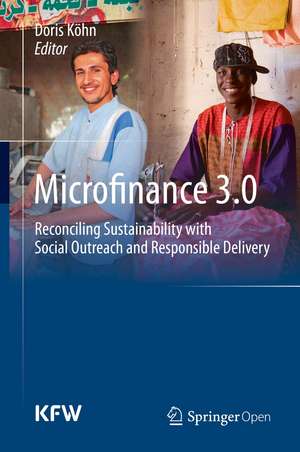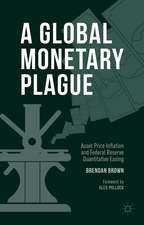Microfinance 3.0: Reconciling Sustainability with Social Outreach and Responsible Delivery
Editat de Doris Köhnen Limba Engleză Hardback – 12 dec 2013
| Toate formatele și edițiile | Preț | Express |
|---|---|---|
| Paperback (1) | 416.54 lei 6-8 săpt. | |
| Springer Berlin, Heidelberg – 27 aug 2016 | 416.54 lei 6-8 săpt. | |
| Hardback (1) | 423.84 lei 6-8 săpt. | |
| Springer Berlin, Heidelberg – 12 dec 2013 | 423.84 lei 6-8 săpt. |
Preț: 423.84 lei
Nou
Puncte Express: 636
Preț estimativ în valută:
81.10€ • 84.68$ • 67.12£
81.10€ • 84.68$ • 67.12£
Carte tipărită la comandă
Livrare economică 05-19 aprilie
Preluare comenzi: 021 569.72.76
Specificații
ISBN-13: 9783642417030
ISBN-10: 3642417035
Pagini: 212
Ilustrații: XI, 199 p. 38 illus.
Dimensiuni: 155 x 235 x 17 mm
Greutate: 0.48 kg
Ediția:2013
Editura: Springer Berlin, Heidelberg
Colecția Springer
Locul publicării:Berlin, Heidelberg, Germany
ISBN-10: 3642417035
Pagini: 212
Ilustrații: XI, 199 p. 38 illus.
Dimensiuni: 155 x 235 x 17 mm
Greutate: 0.48 kg
Ediția:2013
Editura: Springer Berlin, Heidelberg
Colecția Springer
Locul publicării:Berlin, Heidelberg, Germany
Public țintă
Professional/practitionerCuprins
Microfinance in India: Lessons from the Andhra Crisis.- Armageddon or Adolescence? Making Sense of Microfinance's Recent Travails.- Core Values of Microfinance Under Scrutiny: Back to Basics?.- Microcredit Interest Rates and Their Determinants: 2004 - 2011.- Financial Services That Clients Need: The 3.0 Business Models, Reconciling Outreach with Sustainability.- "Microfinance 3.0" - Perspectives for Sustainable Financial Service Delivery.- Microfinance Beyond the Standard? Evaluating Adequacy and Performance of Agricultural Microcredit.- The Role of DFIs in the Emerging 3.0 Responsible Funding Landscape - Responsible Corporate Governance and Beyond.- The Microfinance Approach: Does It Deliver on Its Promise?.
Textul de pe ultima copertă
This book focuses on the achievements, current trends and further potential of microfinance to scale-up and serve many more clients with financial services that enable them to improve their living conditions. The book asks what it takes to achieve sustainable impact: to know your clients and to understand their needs, to treat them in a fair and transparent way, and to safeguard the synthesis between the financial and social dimension of sustainable microfinance. The book also sheds light on the future funding landscape and what is necessary to bring more commercial funders on board while ensuring that these new funders will continue the commitment to responsible finance.While being forward looking, the book reflects the debate on core values of microfinance, triggered by recent criticisms of an approach that was hailed as a panacea in the beginning and which had proved over time as one of the most effective models of development finance. These criticisms emerged over signs of overheating in some markets, particularly the 2010 events in Andhra Pradesh, and turned into an assumption of a worldwide microfinance crisis, putting seriously at stake the good reputation microfinance had enjoyed so far.
Half of the world, and 80 percent of the poor, are excluded from formal financial services. This means that they have to rely on the age-old, informal alternatives that can be unreliable and expensive. Microfinance 3.0 is a highly welcome contribution to the frontiers of financial inclusion – a world in which poor households in the informal economy can access and use the broad range of financial services they need to create livelihoods, smooth consumption, and better manage risks.
Tilman Ehrbeck, CEO CGAP (Consultative Group For The Poor)
Half of the world, and 80 percent of the poor, are excluded from formal financial services. This means that they have to rely on the age-old, informal alternatives that can be unreliable and expensive. Microfinance 3.0 is a highly welcome contribution to the frontiers of financial inclusion – a world in which poor households in the informal economy can access and use the broad range of financial services they need to create livelihoods, smooth consumption, and better manage risks.
Tilman Ehrbeck, CEO CGAP (Consultative Group For The Poor)
Caracteristici
Gives insight into experts' view of the future of microfinance Brings together the opinions of practitioners, academics, and financiers Highlights current trends and challenges of the sector Refines impact evaluation methods Includes supplementary material: sn.pub/extras











